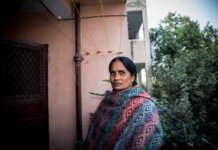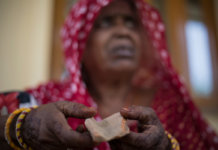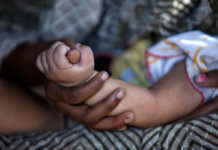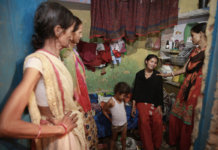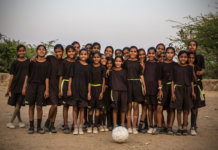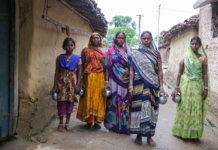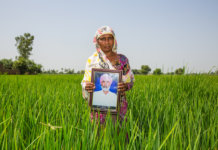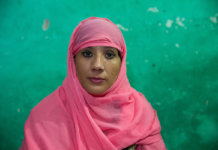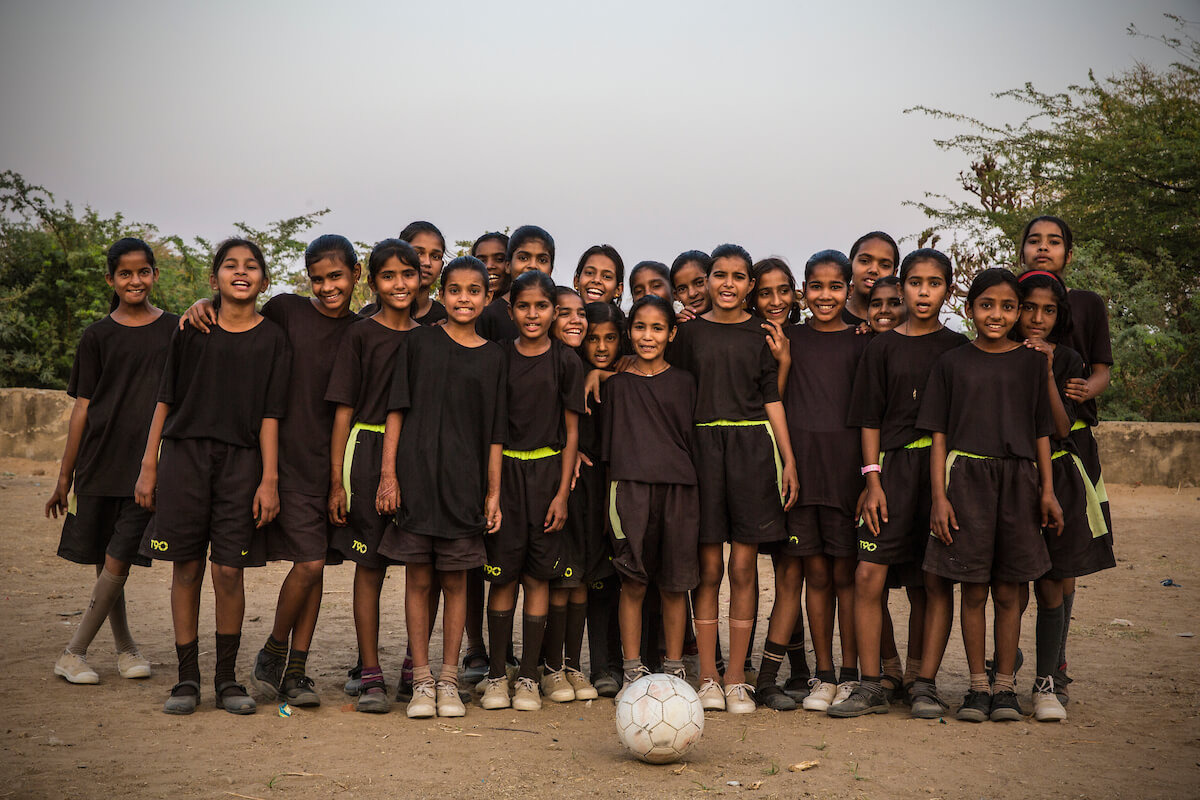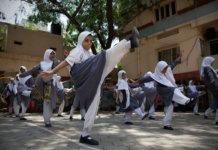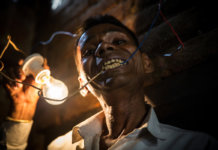A group of teenage girls are fighting the devastating tradition of child marriage in India by learning to play football.
Over 253 girls from four different villages dotted across the state of Rajasthan, in northern India, are all child brides but they have started playing football in a bid to delay their destiny.
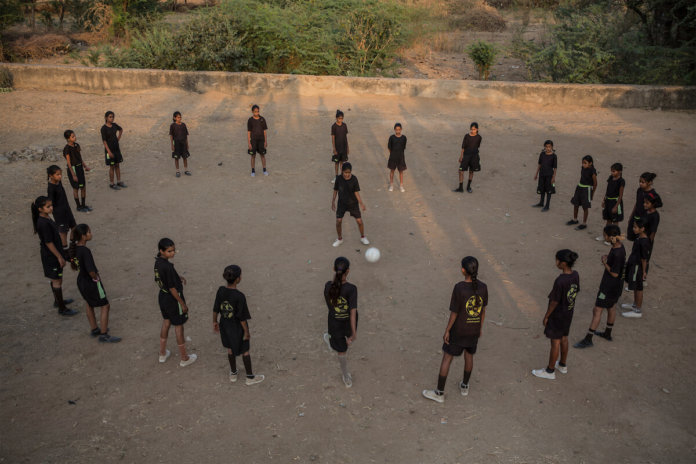
While most of the girls were forced to marry by their parents when they were five or six-years-old, they know the duty to join the husband they have never met will soon fall upon them and they will have to consummate the marriage – the Gauna ceremony – and start family life.
But thanks to an initiative, started by the non-profit organisation Mahila Jan Adhikar Samiti (MJAS), with the support of HAQ: Centre for Child Rights, many of these child brides have learned how to play football and are now using their new found skills in a bit to negotiate their lives with their parents.
Payal Prajapat, 13, was married when she was seven-years-old and knows she will have to join her husband and in-laws one day but now she’s working on her football talents and has big plans for her future.
‘When my parents saw me play football for the first time they were shocked,’ she said. ‘They couldn’t believe my talents. They could see I loved it. So they have agreed not to force me to join my husband for many years yet. But in the mean time I will keep working on them and eventually I will try to annul my marriage so that I can become a professional football player.’
When my parents saw me play football for the first time they were shocked,So they have agreed not to force me to join my husband for many years yet
Payal, who is the team’s leader, is one of many girls who had to persuade her parents to allow her to play the sport when members of MJAS began travelling around the villages suggesting the idea.
The coordinator of the program, Karuna, 42, in Rajasthan, said: ‘The initiative has changed the lives of these girls. While some have simply gained confidence, others have used the sport to fight child marriage and educate their parents on opportunities in life.
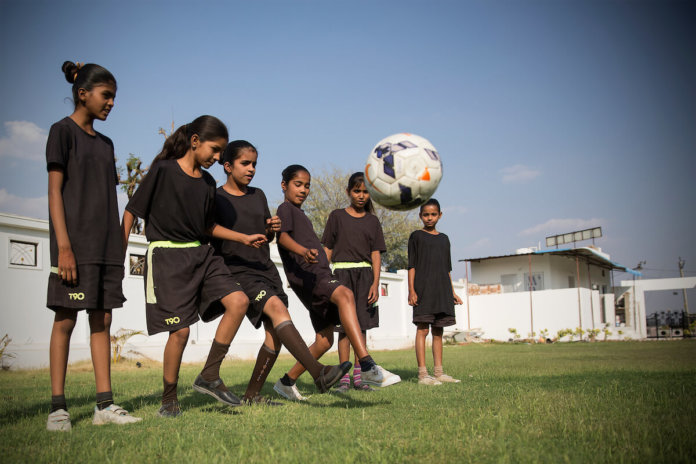
‘It gives us immense pride to see these girls wear shorts and run around freely when they were forced to keep their faces covered under a scarf for so long.’
Karuna explained that when she and her team first decided to visit villages suggesting a football academy for young girls they faced huge problems.
‘We chose football over any other sport because we wanted to remind people that no sport is a male-only sport. Football has often been associated with boys only so we wanted to break that stereotype. But when we visited community centers and schools they were all initially against it.’
MJAS and HAQ wanted to organize a 10-day football camp, back in May 2016, and invite the young girls to participate. But it took weeks of convincing families to consider the idea, before the village-heads eventually got on board.
In the end, the camp went ahead, thanks to donations from other India based charities, and on the last day of training the girls invited their parents to come and watch them play.
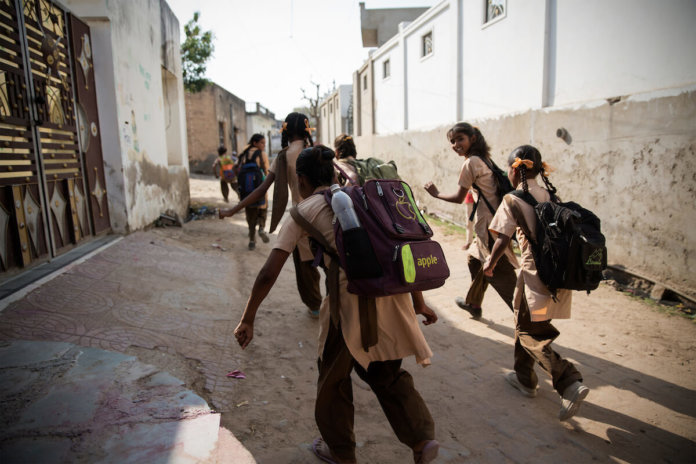
Karuna added: ‘The parents were stunned. They were all very emotional and proud to see their girls playing football so well. The girls picked up the game quickly and showed great fitness. These families had never seen anything like it, and it ignited something in them. It made them want something better for their girls.’
However, there were still many members of the elder community who couldn’t accept such change.
‘One of the grandmothers came to the football ground with a stick and started bashing everyone who was supporting the initiative. She was adamant girls were not supposed to wear such clothes, play such games or laugh loudly. It took a lot of time and patience to convince the elders to see things differently and open their eyes.’
The girls now devote two hours a day after school to practicing football in their black kits, before they have to return home to their duties.
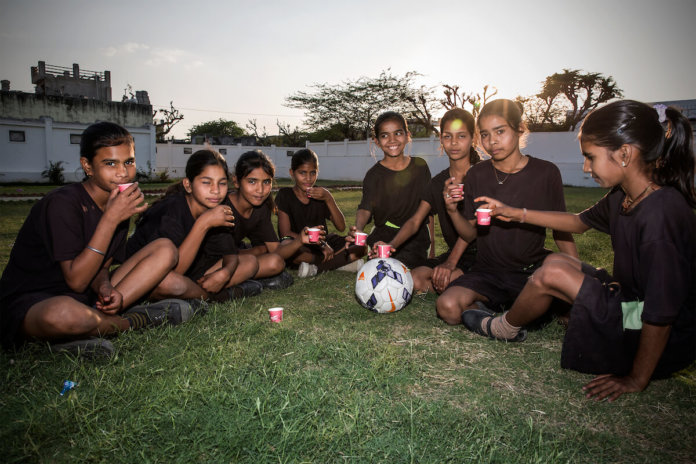
Many of them admit they’ve never heard of Manchester United or Cristiano Ronaldo, they don’t even have the funding for proper goal posts, but it hasn’t dampened their passion.
Payal added: ‘Football has become my passion and it has taught me about my own confidence. I’m determined to do well, and I know I will. When my parents tell me I will be joining my husband soon, I now tell them I’ll call the police on the day they do so.
Payal, who plays mid-field, remembers her wedding day clearly and how she refused to go. ‘I woke up one morning and my parents told me I was getting married that day. I kept refusing but they forced me. They tried to force me to wear a dress but I refused. So I wore my jeans instead. The ceremony still went ahead. I do not want to join my husband; I’ve not seen him since. My dream is football and I will fight for my dream.’
Coach Aarti said: ‘These girls were raw when I first met them. It took time and patience to train them. But now, their enthusiasm is incredible. I am hopeful the sport will help them shape their future.’
Many of the girls also use the sport as relief from family duties and the pressures at home.
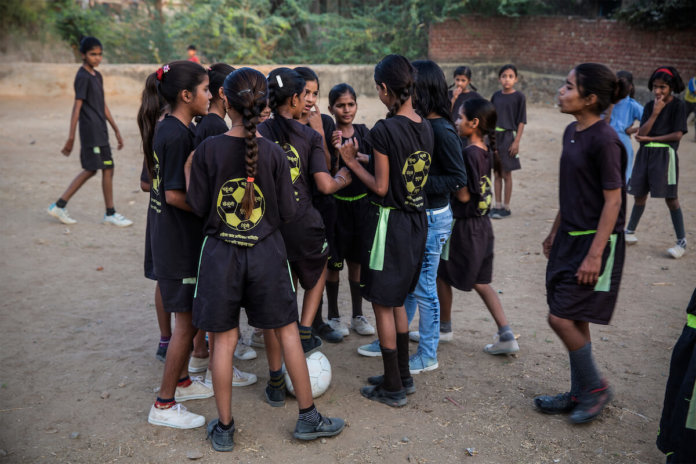
Kiran Gurjar, 11, who likes to play defense, said: ‘I was a toddler when I was married to a boy from a different village. My mother told me two years ago that I was married and I will be going to join my husband in the coming years. The idea scares me. It terrifies me every time I think about it.
‘I love coming here. And I hate Sundays as there’s no football on Sundays. Football keeps me occupied and gives me little time to stress about my future.’
Karuna explains that girls in Rajasthan never dream of falling in love or marriage as the idea is arranged for them before they even hit puberty.
‘Some girls are married off as infants,’ she said. ‘They’re still playing with dolls when they’re made to take their marriage vows. It is shocking but true, and it’s still very prevalent in communities here.’
Sanju and Manju Gurjar, 13, are twin sisters, both were married at the age of five along with their younger sister who was only 15-days-old at the time. They dream of becoming a doctor and teacher but they know one day they will have to join their husbands.
‘All three of us are already married,’ Sanju said. ‘But none of us want to join our husbands. We know our husband’s name but we don’t know him. I think our parents were going to send us to our husbands over the next couple of years but now we’re playing football they don’t talk about it so much. If I can persuade them to delay the Gauna, then hopefully in time, I can persuade them to annul the marriages also. If it doesn’t work, then at least I can enjoy playing football until I am sent to my husband.’
According to UNICEF’s 2017 report, India has the largest number of child brides in the world, comprising of one-third of the global total.
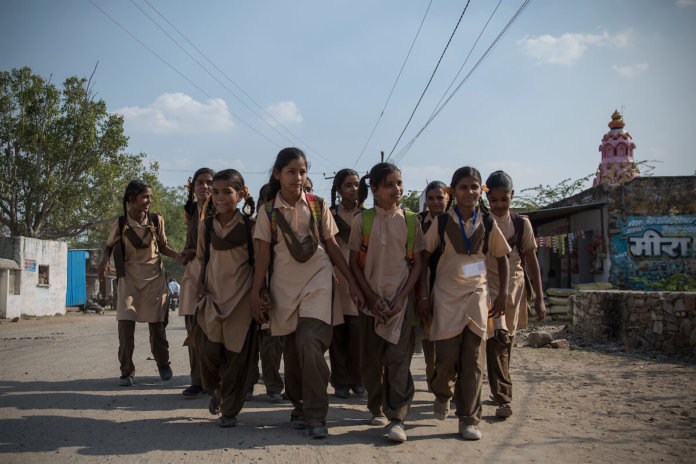
In many rural communities, girls are seen as an economic burden so parents prefer to hand over the responsibility to a husband. Is it estimated that 27pc of girls in India are married before they turn 18. While child marriages in India are actually illegal, poverty and marriage expenses lead families to ignore the law and marry off their daughters at a young age in secret, to reduce living costs.
Indira Pancholi, a consultant of the Child Marriage Initiative, at HAQ, said: ‘We had high hopes for this football initiative and it seems to be working. It is such a joy to see girls shed their fears and wear shorts and run around a field with a ball and be children. I’m glad this idea has proved affective for these girls; however, there is still a long way to go.’

